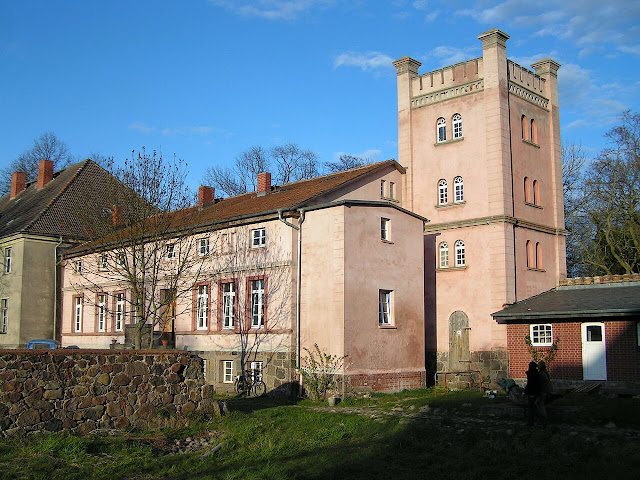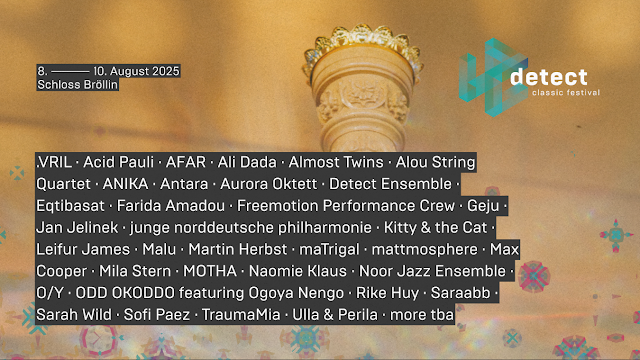Tucked away in the rural quiet of northern Germany, Detect Classic Festival has, over the past few years, established itself as one of the most distinctive events on the European classical music scene. Set against the backdrop of Schloss Bröllin, a 13th-century estate near the German/Polish border hosting artist residencies, the festival brings together contemporary classical, experimental, electronic, and improvised music in a setting that feels as much like a collective experiment as a traditional festival.
What sets Detect Classic Festival apart isn’t just its genre-fluid line-up or the unconventional performances staged in barns and former stables, it’s the sense of curiosity that runs through everything. Big names appear alongside upcoming artists. Unexpected collaborations unfold. Audiences are encouraged not to consume passively, but to explore, to listen closely, and to be surprised. This year’s edition, taking place August 8-10, revolves around a theme that feels especially timely: The Meaning of Live. In a culture where nearly everything is streamed, captured, and shared, what do we really mean when we talk about live music? What value does it still hold for creators, for listeners, and for our collective cultural life?
To find out more about the ideas driving this year’s edition, we spoke with the festival’s founder, Konstantin Udert, about how Detect Classic Festival began, what it’s become, and why the question of what it means to truly experience music in real time has never felt more urgent.
Detect Classic Festival has developed a unique identity over the years. What originally sparked the idea, and what gaps in the cultural landscape were you hoping to fill when you first created it?
We were fortunate that two things happened at the same time. Firstly, the junge norddeutsche philharmonie was looking at ways of better reaching the orchestra musicians’ friends and family as concertgoers. Between 19 and 27 years of age, the orchestra musicians are significantly younger than the average classical concertgoer. Secondly, a Berlin cultural collective had begun to integrate classical music into events and was fascinated by the idea of experiencing a large orchestra at a festival weekend or rave. So it all started with the search for a new audience and artistic interest. These intentions still drive us today!
What makes the setting of Schloss Bröllin so special for the festival?
The intimate size of the grounds with its natural stone buildings and idyllic surroundings, the possibility of creating a wide variety of concert venues indoors and outdoors, and the support of the village community are just a few reasons why we are very happy at Bröllin.
Detect is known for its genre-fluid programming, bringing together everything from contemporary classical and experimental to electronic and improvised music. How do you approach the curation process to ensure it feels cohesive?
We wouldn’t want to give away our secret! But this much we can say: we define moods and feelings in a preliminary schedule and then look for suitable acts. Concepts that require explanation are rather the exception.
While there are quite a few very well-known names on the line-up, Detect has consistently prioritized discovery and unpredictability over name recognition. Why is that approach important to you and the spirit of the festival?
The development of the festival began with the intention of discovering something we didn’t know, and focuses on visitors with an interest in both classical and electronic music. Since a significant portion of the audience would not be interested in the biggest names, we have committed ourselves to a different approach.
Among this year’s contemporary classical artists, are there any in particular you’d like to highlight or that you’re especially excited about introducing to the audience?
Not really, it would be contrary to what I just said. Every visitor will have different highlights.
The 2025 theme, The Meaning of Live, feels especially relevant today. What inspired this theme, and what kinds of questions do you hope the performances and panels will explore or shed light on?
As you say, The Meaning of Live is an invitation to reflect on the intense impressions of the festival and its relevance to the present. Not only the live music – as a counterpoint to generic playlists and AI-generated fake artists – but also the process of planning and creating an extraordinary weekend together with several hundred crew members and artists can be something deeply meaningful.
In today’s culture of constant streaming and digital sharing, what does “live music” mean to you personally?
The fortune and gratitude that music has guided me through life, and given me the opportunity to make life-changing encounters.
There’s a strong emphasis on community at Detect. What kind of community are you hoping to inspire, and have you already seen it taking shape during previous editions of the festival?
We want to create a diverse community that shares a passion for sophisticated art music and is open to new things or things that are different from what you are or like. We also practice listening and “letting be” in our lives outside the festival.
What do you think classical music still has to say in 2025?
It is timeless, touching, and connects without words. That is no small thing in our time.
If someone who’s never been to Detect Classic Festival asks you what makes it different from any other classical or electronic music festival, what’s the one thing you’d want them to know?
You have to experience it, and you are welcome exactly as you are.
 |
| The old manor house at Schloss Bröllin |
Detect Classical Festival is from 8 to 10 August 2025, at Schloss Bröllin – full details from the festival website.
The blog is free, but I’d be delighted if you were to show your appreciation by buying me a coffee.
Elsewhere on this blog
- BBC Proms – Arvo Pärt at 90: Estonian Philharmonic Chamber Choir, Tõnu Kaljuste – concert review
- Baltic Tides: piano music by two important Baltic pianist composers, Lūcija Garūta & Ester Mägi makes for a marvellous, compelling disc – record review
- Frederick and his sister: music for Postsdam and Bayreuth created for Frederick the Great and Wilhelmine of Bayreuth – record review
- Passion project that deserves to be enjoyed: Alastair Penman’s The Last Tree – record review
- To honour the women by giving voice to their experience: pianist Deirdre Brenner introduces The Magdalene Songs – interview
- Satisfying all round: Opera Holland Park’s revival of its 2018 production of Verdi’s La traviata showcases a trio of fine principals – opera review
- Will definitely stay in the memory: Gweneth Ann Rand & Simon Lepper in Judith Weir’s woman.life.song at Wigmore Hall – concert review
- Style & substance: Ambroise Thomas’ Hamlet in Buxton is a rewarding musical & dramatic feast – opera review
- The ennui of modern life: Bernstein & Poulenc’s one-act operas from the 1950s in an intriguing double bill at Buxton International Festival – review
- Old-fashioned drama & a modern gloss: Cecilia Stinton directs Donizetti’s Lucia di Lammermoor at Opera Holland Park with Jennifer France – review
- Home


.png?w=998&resize=998,665&ssl=1)







